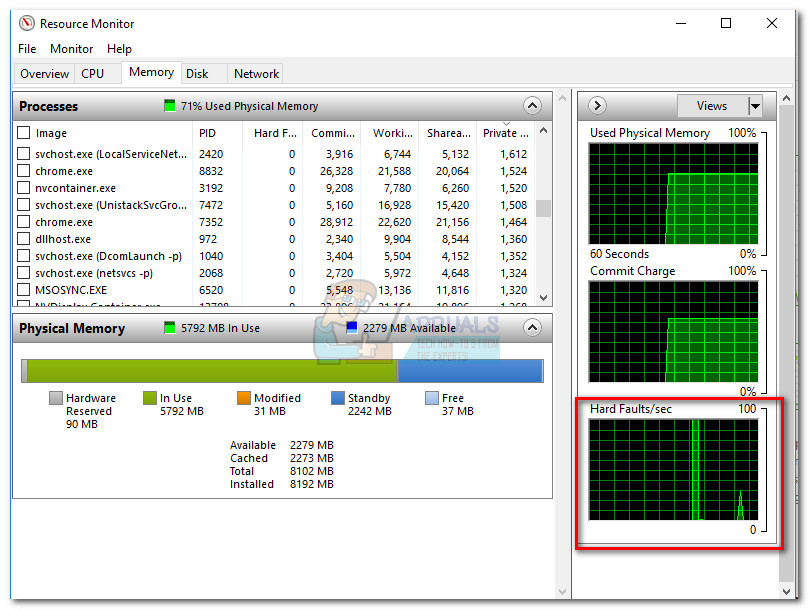interrupts are between hardware and cpu...it is controlled by drivers
you could run latencymon, it could probably tell which driver is doing it
https://www.resplendence.com/latencymon
I ran the test on latencymon and it said that my system has trouble handling real-time audio and other tasks. The test ran for 3 hours and 8 minutes. Though, I don't really understand much of anything here.
Here is what I got. Are reported ISRs and DPCs something I should be concerned about?
_
CONCLUSION
_
Your system appears to be having trouble handling real-time audio and other tasks. You are likely to experience buffer underruns appearing as drop outs, clicks or
pops. One or more DPC routines that belong to a driver running in your system appear to be executing for too long. At least one detected problem appears to be network
related. In case you are using a WLAN adapter, try disabling it to get better results. One problem may be related to power management, disable CPU throttling settings
in Control Panel and BIOS setup. Check for BIOS updates.
LatencyMon has been analyzing your system for 3:08:43 (h🇲🇲ss) on all processors.
_
SYSTEM INFORMATION
_
Computer name: DESKTOP-SSNO3G0
OS version: Windows 10, 10.0, version 2009, build: 19044 (x64)
Hardware: Nitro AN515-54, Acer
BIOS: V1.33
CPU: GenuineIntel Intel(R) Core(TM) i5-9300H CPU @ 2.40GHz
Logical processors: 8
Processor groups: 1
Processor group size: 8
RAM: 8029 MB total
_
CPU SPEED
_
Reported CPU speed (WMI): 240 MHz
Reported CPU speed (registry): 240 MHz
Note: reported execution times may be calculated based on a fixed reported CPU speed. Disable variable speed settings like Intel Speed Step and AMD Cool N Quiet in the
BIOS setup for more accurate results.
_
MEASURED INTERRUPT TO USER PROCESS LATENCIES
_
The interrupt to process latency reflects the measured interval that a usermode process needed to respond to a hardware request from the moment the interrupt service
routine started execution. This includes the scheduling and execution of a DPC routine, the signaling of an event and the waking up of a usermode thread from an idle
wait state in response to that event.
Highest measured interrupt to process latency (µs): 5312.50
Average measured interrupt to process latency (µs): 7.304747
Highest measured interrupt to DPC latency (µs): 5304.70
Average measured interrupt to DPC latency (µs): 2.584217
_
REPORTED ISRs
_
Interrupt service routines are routines installed by the OS and device drivers that execute in response to a hardware interrupt signal.
Highest ISR routine execution time (µs): 695.095833
Driver with highest ISR routine execution time: HDAudBus.sys - High Definition Audio Bus Driver, Microsoft Corporation
Highest reported total ISR routine time (%): 0.008449
Driver with highest ISR total time: Wdf01000.sys - Kernel Mode Driver Framework Runtime, Microsoft Corporation
Total time spent in ISRs (%) 0.016349
ISR count (execution time <250 µs): 1455937
ISR count (execution time 250-500 µs): 0
ISR count (execution time 500-1000 µs): 315
ISR count (execution time 1000-2000 µs): 0
ISR count (execution time 2000-4000 µs): 0
ISR count (execution time >=4000 µs): 0
_
REPORTED DPCs
_
DPC routines are part of the interrupt servicing dispatch mechanism and disable the possibility for a process to utilize the CPU while it is interrupted until the DPC
has finished execution.
Highest DPC routine execution time (µs): 3928.986667
Driver with highest DPC routine execution time: ndis.sys - Network Driver Interface Specification (NDIS), Microsoft Corporation
Highest reported total DPC routine time (%): 0.027162
Driver with highest DPC total execution time: dxgkrnl.sys - DirectX Graphics Kernel, Microsoft Corporation
Total time spent in DPCs (%) 0.087405
DPC count (execution time <250 µs): 8660897
DPC count (execution time 250-500 µs): 0
DPC count (execution time 500-10000 µs): 5651
DPC count (execution time 1000-2000 µs): 14
DPC count (execution time 2000-4000 µs): 2
DPC count (execution time >=4000 µs): 0
_
REPORTED HARD PAGEFAULTS
_
Hard pagefaults are events that get triggered by making use of virtual memory that is not resident in RAM but backed by a memory mapped file on disk. The process of
resolving the hard pagefault requires reading in the memory from disk while the process is interrupted and blocked from execution.
NOTE: some processes were hit by hard pagefaults. If these were programs producing audio, they are likely to interrupt the audio stream resulting in dropouts, clicks
and pops. Check the Processes tab to see which programs were hit.
Process with highest pagefault count: msmpeng.exe
Total number of hard pagefaults 228572
Hard pagefault count of hardest hit process: 41724
Number of processes hit: 153
_
PER CPU DATA
_
CPU 0 Interrupt cycle time (s): 373.484999
CPU 0 ISR highest execution time (µs): 695.095833
CPU 0 ISR total execution time (s): 14.159173
CPU 0 ISR count: 1378677
CPU 0 DPC highest execution time (µs): 3928.986667
CPU 0 DPC total execution time (s): 62.251518
CPU 0 DPC count: 6702385
_
CPU 1 Interrupt cycle time (s): 145.150133
CPU 1 ISR highest execution time (µs): 517.21250
CPU 1 ISR total execution time (s): 0.620613
CPU 1 ISR count: 74494
CPU 1 DPC highest execution time (µs): 1206.313333
CPU 1 DPC total execution time (s): 9.486539
CPU 1 DPC count: 597507
_
CPU 2 Interrupt cycle time (s): 113.619749
CPU 2 ISR highest execution time (µs): 523.040833
CPU 2 ISR total execution time (s): 0.030965
CPU 2 ISR count: 3079
CPU 2 DPC highest execution time (µs): 709.341667
CPU 2 DPC total execution time (s): 2.075692
CPU 2 DPC count: 355373
_
CPU 3 Interrupt cycle time (s): 106.737851
CPU 3 ISR highest execution time (µs): 35.0050
CPU 3 ISR total execution time (s): 0.000036
CPU 3 ISR count: 2
CPU 3 DPC highest execution time (µs): 820.160833
CPU 3 DPC total execution time (s): 0.961793
CPU 3 DPC count: 193485
_
CPU 4 Interrupt cycle time (s): 68.839164
CPU 4 ISR highest execution time (µs): 0.0
CPU 4 ISR total execution time (s): 0.0
CPU 4 ISR count: 0
CPU 4 DPC highest execution time (µs): 618.30750
CPU 4 DPC total execution time (s): 1.835447
CPU 4 DPC count: 350097
_
CPU 5 Interrupt cycle time (s): 60.033340
CPU 5 ISR highest execution time (µs): 0.0
CPU 5 ISR total execution time (s): 0.0
CPU 5 ISR count: 0
CPU 5 DPC highest execution time (µs): 614.141667
CPU 5 DPC total execution time (s): 0.429355
CPU 5 DPC count: 95498
_
CPU 6 Interrupt cycle time (s): 73.707197
CPU 6 ISR highest execution time (µs): 0.0
CPU 6 ISR total execution time (s): 0.0
CPU 6 ISR count: 0
CPU 6 DPC highest execution time (µs): 598.616667
CPU 6 DPC total execution time (s): 1.479365
CPU 6 DPC count: 228861
_
CPU 7 Interrupt cycle time (s): 72.071492
CPU 7 ISR highest execution time (µs): 0.0
CPU 7 ISR total execution time (s): 0.0
CPU 7 ISR count: 0
CPU 7 DPC highest execution time (µs): 707.680
CPU 7 DPC total execution time (s): 0.661305
CPU 7 DPC count: 143358
_


